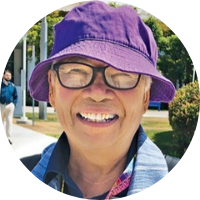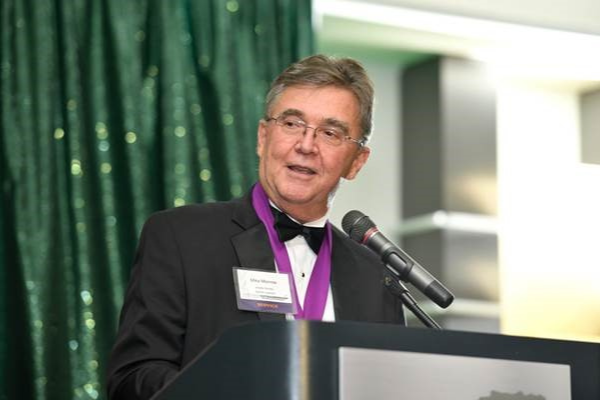
Did you decide unilaterally as to when you would leave your formal career? If so, how did you know the time was right?
I decided unilaterally to leave teaching chemistry at the College of New Rochelle in 2006 at the ripe old age of 72. Why? Over a period of months, I realized that my hearing was getting really bad. Even hearing aids were not helping me to understand students’ questions since they never enunciated and spoke too quickly even if asked to slow down.
I ended up always asking the students to repeat their questions while I stood up close to them to try to understand. While I normally have no trouble conversing with and understanding adults, this peculiarity of the younger generation was very difficult to deal with. But there was another compelling reason to retire: I had a lot of work to do with my publications, which badly needed updating, but I could never find the time.
How did your identity change when you left your formal career?
As I settled into re-writing and updating the six ChemSource books preparatory to a new release, I remained as connected to chemistry and with ACS as always. It took me three years to do this job, and by 2009, I was ready to release the updates on DVDs and a CD-ROM.
1000 copies were printed, and they were placed in the hands of the ACS Education Division to sell. This arrangement went on for about six years. Meanwhile, I attended all of the ACS National Meetings (as Councilor and also was active in programming), and all of the chemical education summer conferences and numerous regional meetings to promote “The New ChemSource.”
Do you still stay connected to the chemistry enterprise? If so, how?
Oh, yes. As mentioned above, I remained fully immersed in chemistry, not only by attendance at meetings and correspondence with colleagues, but also with editing and writing chemistry-related books.
Since my retirement in 2006, in addition to the updating of the six ChemSource books, I edited, co-edited, authored and co-authored nine additional books, bringing the grand total up to twenty books (I had previously written five other books in addition to the ChemSource volumes), and there is one in the hopper at the moment under contract with the Royal Society of Chemistry (sorry!).
Did you move when you retired? How did you make that decision?
From 2006 to 2009, I remained where I was at our convent in New Rochelle while I was updating the ChemSource books. In fact, I had an office at the college and went into “work” every day. In mid-2009, I got a phone call from my Mother General in Rome asking me to come to Rome to work at the Generalate. The primary job would be to build the order’s website and maintain it; she said it would be part-time and that I would be free to do other things if I wished.
So, I moved to Rome and remained there for five years, finishing up the job at the end of 2014. Meanwhile, I took a crash course in French since the website was bilingual (French and English) and also refurbished my Italian since the language of the house and the country was Italian. To do the latter, I decided to translate from Italian to English a book published by the Italian Chemical Society called “De Reditu Eorum.”
I ended up re-writing the book and succeeded in getting it published by Oxford University Press as the third author with the title “The Lost Elements: The Periodic Table’s Shadow Side.” This was the second of the nine more books published since ChemSource (Springer’s “The Chemical History of Color” had come out in 2013).
Since there was a lot of coming and going at the Generalate, I met many sisters from various other parts of the world. One of their growing concerns was how to educate their younger sisters in English since it was fast becoming the “Lingua Franca” worldwide. As a result, when I finished my term at the Generalate, I have been spending (before the pandemic) as much as eight to nine months in various countries in Europe, mostly Poland, the Czech Republic, Austria and Slovakia, tutoring English (and writing chemistry in my spare time, although it was really spare; I often taught 48 hours per week).
My loss of hearing was not a difficulty, since I was teaching one-on-one and non-native speakers necessarily speak slowly and enunciate carefully. A side benefit was that I learned a lot of Czech, Slovak and Polish (and refurbished my German). I also learned how to navigate around all of these countries by bus and train, so knowing a bit of the language was very helpful.
What do you wish you knew about retirement before you retired?
I really can’t think of anything. When I retired, I had a good reason since continued teaching to young people was untenable, and I also had a plan, albeit short-term. Then things unfolded after that and I simply went along with the flow.
What’s your best piece of advice for people thinking about retirement?
Aside from suggesting joining a convent, I would advise anyone planning to retire to retire TO something rather than FROM something. The more you keep your body and your brain active doing what you really enjoy but also have purposeful activities, the healthier you will remain. The fact of my membership in a religious order has been one of the biggest plusses, but I realize that it is not for everyone.

Mary Virginia Orna, PhD, is Professor Emerita of Chemistry, College of New Rochelle, New York. Her academic specialties are in the areas of color chemistry and archaeological chemistry. She is an ACS Councilor for the Division of the History of Chemistry and has served on numerous ACS committees over the past thirty years.
Her more recent books include The Chemical History of Color (2013), Science History: A Traveler’s Guide (2014), The Lost Elements: The Periodic Table’s Shadow Side (2015), Sputnik to Smartphones: A Half-Century of Chemistry Education (2015), Carl Auer von Welsbach: Chemist, Inventor, Entrepreneur (2017), Chemistry’s Role in Food Production and Sustainability: Past and Present (2019) and Archaeological Chemistry: A Multidisciplinary Analysis of the Past (2020).
She is presently preparing a book under contract with the Royal Society of Chemistry, March of the Pigments. She has thirteen other authored, co-authored or edited books on chemical education and history of chemistry to her credit. She is also the recipient of numerous chemical education and service awards, the latest being the American Chemical Society 2021 HIST Award “for her original research in the area of color and pigment chemistry.”
In 1989, she was designated the New York State Professor of the Year and National Gold Medalist. In 1994 she served as a Fulbright Fellow in Israel. Her hobby is constructing crossword puzzles; she has contributed many of these to the New York Times and to many ACS publications as well. She is a religious of the Ursulines of the Roman Union.
Copyright 2021 American Chemical Society (All Rights Reserved)
This article has been edited for length and clarity. The opinions expressed in this article are the author's own and do not necessarily reflect the view of their employer or the American Chemical Society.











